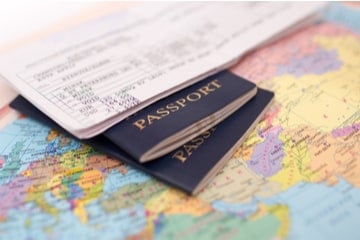-
Medical treatment costs: If you need medical care while in Japan, your insurance can cover the cost of treatment.
-
Cancellation cover: If your flights or other connecting travel gets cancelled, you may be able to claim compensation.
-
Theft, damage or loss: Most insurance providers will cover you for lost or stolen baggage. You might need to buy gadget cover for more expensive electronic items though.
-
Emergency repatriation: This can cover the cost of travelling home in an emergency. The long flight time to Japan can mean that flights are incredibly costly if you're not covered.
-
Travel disruption: This could be because of strikes or adverse weather that causes disruption to your travel plans.
What’s healthcare like for Brits in Japan?
Healthcare isn't free in Japan, and you won't be able to use your GHIC (Global Health Insurance Card) there.
The quality of healthcare in Japan is very high, which is why it can be expensive. You'll also need to pay for any medicines you need, so getting travel insurance can be a good way to save on unwanted expenses.
Some common medicines are also banned in Japan.
Even with a valid prescription, you might not be able to bring these medicines into the country.
According to the UK Government, medicines currently banned in Japan include:
- Vicks inhalers.
- Medicines for allergies and sinus problems.
- Cold and flu medication containing pseudoephedrine
- Some over-the-counter painkillers containing codeine
What our travel insurance expert says
What type of travel insurance should I get for Japan?
This depends on how often you travel, and how long you'll be staying. Here're some options to consider:
How much is travel insurance for Japan?
Japan travel insurance costs:
Single-trip1
£10.93
Annual2
£27.05
Backpackers3
£96.27
Travel insurance for Japan could set you back as little as £10.93, though there are many factors that affect what you pay.
Health conditions you have, the length of time you're travelling for and extras you add on to your policy like gadget cover or ski insurance can all affect the price.
To find out exactly what you could pay, compare travel insurance now. We'll show you our best prices we can find for you from some of the UK's top travel insurers in just a few short clicks.
1Cheapest price for single-trip travel insurance. Based on 1 adult aged 30 with no pre-existing medical conditions, travelling in Japan for 1 week. Confused.com data, January 2025.
2Cheapest price worldwide annual travel insurance (excluding the US, Canada, Caribbean and Mexico). Based on 1 adult aged 30 with no pre-existing medical conditions. Confused.com data, January 2025.
3Cheapest price for worldwide backpackers travel insurance (excluding the US, Canada, Caribbean and Mexico). Based on 1 adult aged 30, with no pre-existing medical conditions, travelling for 3 months. Confused.com data, January 2025.
What other adventure activities could I get cover for?
Japan is a hotspot for adventure tourism, with intrepid travellers able to get their fill of fun from everything from climbing Mt. Fuji to kayaking through the mangroves in Yambaru National Park.
While many policies won't cover you for risky activities like these, an adventure travel insurance add-on might.
Your policy could cover things like:
Cycling
Rock climbing
Water sports
When’s the best time to visit Japan?
The most popular times to visit Japan are between the months of March and May, or September through to November. The weather tends to be good during these times. In the peak summer months, it can be very hot and humid. Tokyo can also be rainy in the summer.
April to May is also when the Cherry Blossom Festival, known as the Sakura Blossom festival, takes place. This celebrates the blossoming of the Sakura trees throughout Japan. The exact dates change each year, as the trees blossom at different times year-to-year.
There are some periods that tourists may wish to avoid, though:
Obon festival
New Year
Golden week
Where should I visit in Japan?
Some of the most popular tourist destinations to visit in Japan are:
Osaka
Second largest city after Tokyo, famous for its nightlife, street food and fun-loving locals. Osaka castle is also worth visiting.
Nara
A city full of temples, and hundreds of wild deer who roam in Nara Park and bow to you.
Hiroshima
This is the site of first atomic bomb strike. Hiroshima now has a large memorial known as Peace Park.
Mount Fuji
Japan's highest peak. You can visit from July to early September, with many hikers opting to stay in the halfway hut overnight. If you do decide to visit, booking this is generally advised.
Kyoto
Japan’s former capital, steeped in history and renowned for it’s traditional architecture. Kyoto is also the hotspot of the cherry blossom festival.
Tokyo
Japan’s current capital and the most populous city on earth. You can visit a wide variety of art galleries and museums, there are also countless restaurants and bars to sample.
What's the best way to get around Japan?
Need more help with your trip to Japan?
Do I need a Visa for Japan?
If you're a UK citizen, you'll need a visa to enter Japan. But getting one is usually quick and easy. For shorter trips, you can pick one up at the airport. This will allow you to stay in Japan for up to 90 days. You won't need to apply for this before travelling.
For stays longer than this, you’ll need to apply before you fly. To do this, you'll need to contact the Japanese embassy. Unlike many other countries, you do not need any set length of time left on your passport to obtain a Japanese visa, but it must remain valid until the end of your stay.
You’ll also need to make sure you have a blank page free in your passport for the visa stamp.
Can I get Japan travel insurance if I have a medical condition?
You’ll need to declare any pre-existing conditions to your insurer, otherwise any treatment you need for it may not be covered and you’ll have to foot the bill yourself.
You should be able to travel insurance for pre-existing conditions. You’ll only be covered for emergency treatment though. Any planned treatment will not be covered.
Learn more about travel insurance
Our service is free and compares a wide range of trusted household names. Confused.com is an intermediary and receives commission from theidol.com if you decide to buy through our website which is based on a percentage of the total annual premium. We pride ourselves on impartiality and independence – therefore we don't promote any one insurance provider over another.










